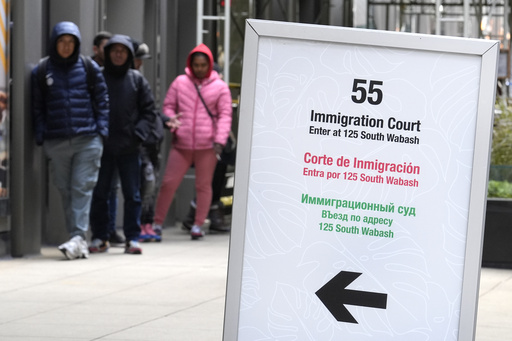In the days following President Donald Trump’s second inauguration, Ruby Robinson visited the immigration court in Detroit to inform those present that her organization’s help desk for individuals facing deportation had ceased operations. The Michigan Immigrant Rights Center, which managed the help desk, had to shut it down after an executive order from Trump led the Justice Department to direct nonprofit organizations to immediately halt their involvement in four federally funded programs designed to assist individuals navigating immigration proceedings.
Robinson, who serves as the center’s managing attorney, noted that the help desk had previously provided support to around 10,000 individuals since its inception in December 2021. “There were individuals in the waiting room who we otherwise would have been able to assist, but we’re not able to do so at this time,” he said. The discontinuation of these educational programs, which supplied critical information about rights and the immigration process in courts and detention centers, raises concerns. Advocates fear that many individuals will be forced to handle their immigration challenges without support, threatening due process and exacerbating existing backlogs in immigration courts.
In response to the stop-work order, a coalition of nonprofit organizations that provide these essential services filed a lawsuit to contest the halt and to request restoration of access to the programs. Despite losing federal funding, the staff at the Amica Center for Immigrant Rights attempted to provide assistance at a detention facility in Virginia shortly after the order took effect. However, Amica’s executive director, Michael Lukens, shared that they were escorted out after interacting with only about two dozen individuals. “We often hear that people don’t know what’s happening. Why are they detained? What’s going to happen next? And we are being stopped from even giving that basic level of orientation,” he explained, expressing the dire implications of the sudden service interruption.
The National Immigrant Justice Center operates a help desk in Chicago’s immigration court, where they were able to assist over 2,000 individuals in 2024. Launched in 2013 with private funding, the initiative expanded through federal funds three years later. Following the issuance of the stop-work order, the organization is now providing limited services and is uncertain about the sustainability of this approach without federal financial support, according to spokesperson Tara Tidwell Cullen. Numerous organizations reported that posters encouraging individuals to seek legal assistance have been removed from detention facilities, further impeding access to necessary resources.
Congress allocates $29 million annually to support four key programs that include the Legal Orientation Program, Immigration Court Helpdesk, Family Group Legal Orientation, and Counsel for Children Initiative. This funding is shared among various groups nationwide, and while the programs receive bipartisan backing, they have historically had to seek private funding to bridge budget gaps. Previously, during Trump’s first term, similar proposed funding cuts were retracted due to potential legal challenges and pushback from congressional members. However, this current stop-work order differed significantly, being issued only hours before its enforcement, which denied program staff entry into detention facilities.
Navigating immigration law poses significant challenges, particularly because, unlike in criminal cases, individuals do not have a constitutional right to free legal representation. As a result, many must navigate the complex system alone. Currently, the immigration court system is burdened with approximately 3.7 million pending cases, which can leave individuals in limbo for extended periods. Advocates argue that when individuals comprehend the process and have their affairs organized, judicial proceedings can progress more efficiently as judges do not need to provide foundational explanations to each newcomer. This efficiency can also lead to shorter lines at filing stations, alleviating congestion in immigration courts as individuals come prepared with the required documentation.
Edna Yang, co-executive director of American Gateways, which works in three detention centers as well as an immigration court in San Antonio, Texas, emphasized that informed individuals tend to make better decisions regarding their cases, either pursuing them with a clear understanding of the risks or choosing to withdraw if relief options do not align with their circumstances. “Stopping programs that actually help people get the information they need isn’t going to fix the system,” Yang cautioned, asserting that the elimination of vital resources will further aggravate the existing issues.
These organizations also play a crucial role in safeguarding due process rights, ensuring that individuals are aware of imminent filing deadlines, facilitating access to translators, and preventing deportation orders that could return asylum seekers to life-threatening situations. One individual affected by the cessation of support is Milagro, a 69-year-old woman from Venezuela who arrived in the U.S. in May 2024 through a government app after a prolonged four-year wait in Mexico. For safety reasons, Milagro’s last name remains undisclosed as she fears the repercussions of speaking publicly about her case. She is currently navigating asylum proceedings based on threats to her life in Venezuela due to her political affiliations. Upon seeking assistance at the El Paso immigration court, she was disheartened to find the help desk shut down as a result of the order.
“The window that you had open to ask, to get advice, is closed,” she expressed in Spanish, revealing feelings of frustration and solitude. She lamented the lack of support, stating, “I would have had to pay money that I do not have.” With a court appearance looming in February, she fears that she will have to allocate a significant portion of her modest earnings as a caretaker to secure legal assistance.
